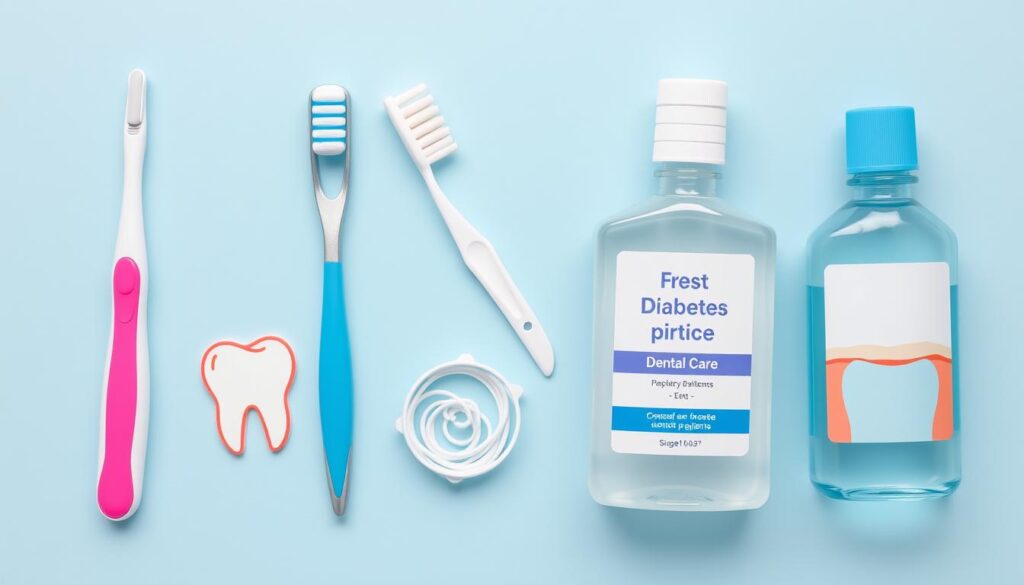Diabetes can harm almost every part of the body, from the heart to the eyes. High blood sugar can cause nerve damage, kidney disease, or vision problems. It’s important to learn how to prevent these issues to live a healthier life.
Managing diabetes complications starts with knowing their causes. High blood sugar damages blood vessels and nerves. This increases the risk of heart disease, infections, and other serious conditions. Early action, like regular check-ups and lifestyle changes, can greatly reduce these risks.
Contents
- 1 Understanding Diabetes Complications: An Overview
- 2 The Impact of Blood Sugar Control on Your Health
- 3 MEDICATIONS TREAT DIABETES SYMPTOMS, DIET TREATS THE MAIN CAUSE
- 4 Cardiovascular Complications in Diabetic Patients
- 5 Diabetic Retinopathy and Vision Problems
- 6 Understanding Diabetic Neuropathy
- 7 Kidney Disease and Diabetes
- 8 Sugar Defender - Boost That Helps Lower Blood Sugar
- 9 Skin and Foot Complications
- 10 Dental and Oral Health Issues
- 11 The Link Between Diabetes and Mental Health
- 12 Preventing Diabetes Complications Through Lifestyle Changes
- 13 Essential Monitoring and Screening Tests
- 14 Building Your Healthcare Support Team
- 15 Emergency Signs and Symptoms to Watch For
- 16 Treatment Options and Management Strategies
- 17 Living Well Despite Diabetes Complications
- 18 Conclusion: Taking Control of Your Diabetes Journey
- 19 FAQ
- 19.1 What are the most common complications of diabetes?
- 19.2 What causes diabetic complications?
- 19.3 What are the risk factors for developing diabetic complications?
- 19.4 How does blood sugar control impact the development of diabetic complications?
- 19.5 What is diabetic retinopathy, and how can it be managed?
- 19.6 What is diabetic neuropathy, and how can it be treated?
- 19.7 How can kidney disease be prevented in people with diabetes?
- 19.8 What are some common skin and foot complications associated with diabetes?
- 19.9 How does diabetes affect mental health, and what can be done to manage it?
- 19.10 What are the key monitoring and screening tests for people with diabetes?
Key Takeaways
- Diabetes complications often develop due to prolonged high blood sugar levels.
- Heart disease, nerve damage, and vision loss are common diabetes related complications.
- Managing diabetes complications requires consistent blood sugar monitoring.
- Regular doctor visits help catch problems before they worsen.
- Healthy eating and exercise play a major role in prevention.
Understanding Diabetes Complications: An Overview
Diabetes can harm nearly every part of the body if not managed well. It starts with high blood sugar damaging blood vessels, nerves, and organs. Early treatment can slow or prevent serious problems.
What Causes Diabetic Complications
High glucose levels cause inflammation and strain on the body. Over time, this weakens arteries and reduces blood flow to organs like the kidneys. Uncontrolled diabetes can damage the body slowly, even before symptoms show.
“Early detection through regular screenings is the cornerstone of managing diabetes-related health risks.” – American Diabetes Association
Risk Factors for Developing Complications
More than just blood sugar levels contribute to complications. Key factors include:
- Poor long-term glucose control (high A1C levels)
- High blood pressure or cholesterol
- Smoking or sedentary lifestyle
- Genetic predisposition
Timeline of Complications Development
Damage can start quietly within 5-10 years of uncontrolled diabetes. Kidney problems or vision changes may be the first signs. Treatment like medication or lifestyle changes can slow progression.
Annual check-ups help catch changes early. This gives patients a chance to change their health path.
The Impact of Blood Sugar Control on Your Health
Keeping your blood sugar levels stable is key to avoiding diabetes problems. Unstable glucose can harm your heart, kidneys, and eyes. By keeping your levels steady, you lower the risk of nerve damage, vision loss, and heart disease. Managing diabetes starts with simple daily habits.
Effective strategies for managing diabetes complications include:
- Monitoring glucose levels with devices like FreeStyle Libre or Dexcom G6
- Balancing meals with fiber-rich vegetables and lean proteins
- Incorporating 30 minutes of walking or swimming daily
- Reviewing medications with your doctor to adjust dosages as needed


“Small, consistent changes in blood sugar control can lead to significant long-term health improvements.”
| Blood Sugar Target | Recommended Range |
|---|---|
| Fasting (Morning) | 80–130 mg/dL |
| Before Meals | 80–130 mg/dL |
| 2 Hours After Eating | Below 180 mg/dL |
| A1C (3-Month Average) | Below 7% |
Preventing diabetes complications also involves regular screenings. Annual eye exams, kidney function tests, and cholesterol checks help catch issues early. Adding stress-reduction practices like yoga or mindful breathing supports overall stability. Diabetes management isn’t about being perfect—it’s about consistent effort for lasting results.

MEDICATIONS TREAT DIABETES SYMPTOMS, DIET TREATS THE MAIN CAUSE
No medicine will be enough to balance your blood sugar if you are not committed to proper nutrition.
Cardiovascular Complications in Diabetic Patients
Diabetes raises the risk of heart attacks and strokes. High blood sugar damages blood vessels. This can lead to poor blood flow and even limb amputations. Managing diabetes well is key to keeping the heart healthy.
Heart Disease and Stroke Risks
Diabetics are twice as likely to get heart disease. To lower risks, take these steps:
- Check blood sugar levels every day
- Stop smoking to improve blood flow
- Exercise for 30 minutes daily, like walking or swimming
Spotting symptoms early, like chest pain or sudden numbness, can save lives.
🧴Click Here🧴 and learn about specific supplements to optimize blood flow and avoid circulatory problems in diabetics.
High Blood Pressure Management
“Controlling blood pressure is as critical as managing glucose for diabetics.” — American Heart Association
Keep blood pressure under 130/80 mmHg. Eat less sodium and more potassium-rich foods like spinach. If needed, take ACE inhibitors as prescribed.
Cholesterol Control Strategies
High LDL cholesterol can clog arteries. Here’s a guide for the best levels:
| Cholesterol Type | Target Level |
|---|---|
| LDL (“Bad”) | Below 100 mg/dL |
| HDL (“Good”) | Above 50 mg/dL (women), 40 mg/dL (men) |
| Triglycerides | Below 150 mg/dL |
Statins, like Lipitor, are often used. Eat a diet low in saturated fats too.
Regular check-ups and lifestyle changes are crucial. Staying informed helps manage diabetes complications and keep the heart healthy.
Diabetic Retinopathy and Vision Problems
Diabetic retinopathy is a common problem for people with diabetes. It damages blood vessels in the retina. This can lead to vision loss or blindness if not treated.
Nearly one-third of people with diabetes have this condition. Regular eye exams are key to catching it early.
Symptoms often start without warning. They can include:
- Blurred or fluctuating vision
- Dark spots or floaters
- Difficulty seeing colors
- Poor night vision
| Risk Factor | Impact on Vision |
|---|---|
| Duration of diabetes | Longer duration increases retinal damage risk |
| Uncontrolled blood sugar | Accelerates blood vessel deterioration |
| High blood pressure | Worsens retinal swelling and leakage |
| High cholesterol | Contributes to fatty deposits in retinal vessels |
| Smoking | Doubles progression rate of retinopathy |
Treatment varies based on the stage of diabetic retinopathy. Mild cases might just need better blood sugar control. But more severe cases might need:
- Anti-VEGF injections to reduce swelling
- Laser therapy to seal leaking blood vessels
- Vitrectomy surgery for severe bleeding
“Annual dilated eye exams are non-negotiable for anyone with diabetes. Early intervention can save up to 95% of vision loss cases.”
Preventing vision loss from diabetic retinopathy starts with controlling diabetes. This means eating right, exercising, and taking medication. Also, regular screenings are crucial to catch changes early.
Vision problems from diabetes are serious but can be managed. With consistent care and timely treatment, vision loss can be prevented.
Understanding Diabetic Neuropathy
Diabetic neuropathy happens when high blood sugar damages nerves over time. It affects nearly half of people with diabetes. It starts subtly but can cause severe discomfort or life-altering complications if not managed. Recognizing early signs and taking proactive care can help reduce risks.
Peripheral Neuropathy Symptoms
The most common form, peripheral neuropathy, affects feet and hands. Symptoms include:
- Tingling or numbness resembling “pins and needles”
- Sharp pain or cramping, especially at night
- Reduced sensitivity to temperature changes
Autonomic Neuropathy Effects
This type disrupts involuntary functions like digestion or heart rate. Key effects involve:
- Dizziness when standing due to blood pressure drops
- Bladder control issues or constipation
- Difficulty sensing low blood sugar episodes
Treatment Options for Nerve Damage
“Managing diabetic neuropathy requires a dual approach: stabilizing blood glucose and addressing symptoms directly. Regular monitoring and lifestyle adjustments are foundational.” — American Diabetes Association
- Medications like duloxetine or pregabalin for pain relief
- Physical therapy to improve circulation and mobility
- Blood sugar management through diet and medication
Early intervention slows nerve damage progression. Discussing symptoms with a healthcare provider ensures personalized strategies. This includes prescription treatments and daily foot care routines.


Kidney Disease and Diabetes
Kidney disease is a big problem for people with diabetes. High blood sugar harms the kidneys’ blood vessels, making them less effective. Since early stages often have no symptoms, regular doctor visits are key.
Look out for these signs as kidney disease gets worse:
- Swollen ankles or puffy eyes
- Foamy or dark urine
- Persistent fatigue
- Increased need to urinate

Sugar Defender - Boost That Helps Lower Blood Sugar
See the full review of this product. Benefits in balancing blood sugar. Testimonials and side effects.
“Drinking enough water helps flush toxins and may lower risks of kidney infections,” says the National Kidney Foundation. Drinking water and checking blood sugar can protect your kidneys.
Bladder infections are common in people with diabetes. High glucose in urine is perfect for bacteria. If not treated, these infections can move to the kidneys, causing more harm. To prevent this, take these steps:
- A1C tests every 3-6 months
- Annual urine albumin checks
- Blood pressure below 130/80 mmHg
| Key Kidney Test | Frequency | Purpose |
|---|---|---|
| eGFR Blood Test | Yearly | Measures filtration rate |
| Urine Albumin | Annual | Detects protein leakage |
| Blood Urea Nitrogen | As needed | Assesses waste levels |
Managing diabetes complications involves medicine and lifestyle changes. Eating less salt, staying at a healthy weight, and avoiding certain painkillers are important. Early action can stop kidney failure, avoiding dialysis or transplants.
Skin and Foot Complications
Diabetes can harm many parts of the body, especially the skin and feet. High blood sugar can cause infections or slow-healing wounds. Nerve damage raises the risk of foot problems. Managing diabetes well can lower these risks and keep you healthy.
Common Skin Conditions
Diabetes can lead to skin issues due to poor circulation or weak immunity. Common problems include:
- Bacterial infections (styes, boils)
- Fungal infections (athlete’s foot, yeast)
- Diabetic dermopathy (shin spots)
Keeping skin clean and moisturized helps prevent these issues.
Foot Care Essentials
Foot problems like ulcers or infections need daily care. Here’s what to do:
- Check feet for cuts, blisters, or swelling
- Wear shoes that breathe and have cushioned soles
- Avoid walking barefoot to prevent injuries
- Trim nails straight across to avoid ingrowth
When to See a Doctor
| Symptom | Action |
|---|---|
| Persistent redness/swelling | Schedule a same-day visit |
| Numbness or tingling | Check for neuropathy |
| Non-healing sores | Seurgent wound care |
“Annual foot exams are critical for detecting early signs of nerve damage or circulation issues.” – American Diabetes Association
Acting early on diabetes complications can prevent big problems. Watch for changes in your skin or feet. Work with your healthcare team for the best care.
Dental and Oral Health Issues

Diabetes can quietly harm your mouth, gums, and teeth. If blood sugar levels are not well-controlled, gum disease, infections, and slow healing become more likely. Taking care of your teeth is key to managing diabetes, as oral health problems can make blood sugar levels worse.
“People with diabetes are 3 times more likely to develop severe gum disease than those without diabetes,” notes the American Diabetes Association.
Diabetes can lead to several oral health issues, including:
- Gum disease (periodontitis) causing redness, swelling, or bleeding
- Dry mouth (xerostomia) due to reduced saliva flow
- Thrush, a fungal infection from high glucose in saliva
- Slow healing after dental procedures
| Prevention Tips | Products to Consider |
|---|---|
| Brush twice daily with fluoride toothpaste | Colgate Total, Sensodyne |
| Floss daily to remove plaque between teeth | Oral-B Glide, Listerine Floss |
| Use antimicrobial mouthwash | Crest Pro-Health, TheraBreath |
| Schedule dental cleanings every 6 months | – |
Regular dental visits are crucial for early problem detection. Tell your dentist about your diabetes to get personalized care. Combining good oral hygiene with blood sugar checks is a powerful way to fight off complications. Simple actions, like using sugar-free gum or drinking plenty of water, help keep your smile healthy and manage diabetes better.
The Link Between Diabetes and Mental Health
Living with diabetes is more than just managing blood sugar. The daily tasks of treatment and diet changes can really affect your mind. Studies show people with diabetes are more likely to feel depressed and anxious than others.
It’s important to see the whole picture when caring for someone with diabetes. This means looking at their mental health as well as their physical health.
Depression and Anxiety
Diabetes can make you feel isolated or overwhelmed. About 25% of people with diabetes feel depressed, and nearly 40% feel anxious. Symptoms like tiredness, mood swings, or trouble sleeping can be hard to tell apart from blood sugar changes.
Regular mental health screenings are key to catching these issues early.
“Diabetes distress is real. Addressing emotional well-being is as vital as monitoring A1C levels.” — American Diabetes Association
Stress Management Techniques
Stress can make blood sugar harder to control. Finding ways to manage stress is crucial. Here are some effective methods:
- Daily 10-minute mindfulness sessions using apps like Headspace
- Physical activity tailored to ability, such as walking or yoga
- Prioritizing sleep hygiene for 7-9 hours nightly
Building a support network is also important. Joining diabetes education groups or therapy can help you feel less alone. Taking small steps towards managing stress can lead to big improvements in both your mental and physical health.
Preventing Diabetes Complications Through Lifestyle Changes
Small, consistent lifestyle changes can greatly reduce diabetes complications. By making daily habits a priority, you lay the groundwork for long-term health. The American Diabetes Association stresses,
“Proactive adjustments in diet, activity, and stress reduction are proven to slow or prevent complications like nerve damage and heart disease.”
Here are some steps to get you started:
- Prioritize whole foods: Eat more vegetables, lean proteins, and grains to keep blood sugar stable.
- Move daily: Try to do 30 minutes of brisk walking or cycling to boost insulin sensitivity.
- Manage stress: Use deep breathing or yoga to lower cortisol, which can raise blood sugar.
Good sleep is key in managing diabetes complications. Research shows sleeping less than 7 hours a night can make insulin resistance worse. To improve sleep, avoid screens before bed and keep your bedroom cool.
It’s also important to avoid tobacco and too much alcohol. Smoking can narrow blood vessels and worsen circulation. Alcohol can mess with how your body handles glucose. Regular health check-ups help make sure your lifestyle choices fit your health goals.
Every choice you make matters. Combining healthy eating with regular exercise is a lasting way to prevent diabetes complications. Use apps like MyFitnessPal or glucose monitors like Dexcom G7 to track your progress and stay motivated.
Essential Monitoring and Screening Tests
Managing diabetes complications starts with regular monitoring and screening. Regular check-ups and daily self-care are key. They help spot risks early, leading to quicker action.
Regular Check-up Schedule
Adults with diabetes should follow this routine:
- A1C test every 3–6 months to track blood sugar trends
- Annual dilated eye exam for retinopathy screening
- Blood pressure checks at every clinic visit
- Cholesterol screening every 1–2 years
Important Health Markers
Key metrics to monitor include:
| Marker | Target | Frequency |
|---|---|---|
| A1C | <7% | Quarterly |
| Blood Pressure | <140/90 mmHg | Monthly |
| LDL Cholesterol | <100 mg/dL | Annual |
Self-monitoring Guidelines
Daily tracking helps control diabetes better:
- Check blood glucose 1–4 times daily using devices like Accu-Chek or FreeStyle Libre
- Inspect feet for cuts, blisters, or swelling
- Log results in apps like MySugar or Glucose Buddy
By combining professional screening with personal monitoring, we can manage diabetes effectively. Small, consistent efforts can greatly reduce long-term risks and improve life quality.
Building Your Healthcare Support Team

Managing diabetes is not just about you. A healthcare team is key to getting the care you need. This team has experts from different fields, all working together to help you manage your diabetes.
- Primary Care Physician: They oversee your care, watch your blood sugar, and send you to specialists when needed.
- Endocrinologist: They focus on hormone-related issues, like adjusting your insulin or meds.
- Certified Diabetes Educator: They teach you how to manage your diabetes, like planning meals and checking your blood sugar.
- Dietitian: They help you plan your diet to keep your blood sugar stable and prevent problems.
- Podiatrist: They take care of your feet, which is important to avoid infections or ulcers.
“Collaboration between patients and their healthcare teams reduces hospitalization rates by 30% in diabetes care.” – American Diabetes Association
Your personal support team is also crucial. Family, friends, or local diabetes groups offer emotional support and help you stay on track. Apps like MySugr or platforms like Beyond Type 1 connect you with others who face similar challenges.
Keep in touch with your healthcare team regularly. This ensures your care plan keeps up with your life changes or new symptoms. Have quarterly check-ins, share your self-monitoring data, and ask questions. With a strong support team, managing your diabetes becomes a team effort towards better health.
Emergency Signs and Symptoms to Watch For
Spotting urgent health changes early can stop serious diabetes problems. Blood sugar issues often lead to emergencies. Knowing the signs of low and high blood sugar helps you act fast.
Recognizing Hypoglycemia
Hypoglycemia happens when blood sugar falls too low. Early signs include:
- Shakiness or trembling
- Sweating without physical activity
- Confusion or difficulty concentrating
Severe hypoglycemia can cause seizures or loss of consciousness. Always carry fast-acting glucose tablets or juice to quickly raise levels.
Signs of Hyperglycemia
Hyperglycemia occurs when blood sugar stays too high. Look out for:
- Excessive thirst or dry mouth
- Frequent urination, especially at night
- Blurred vision or persistent fatigue
“Untreated hyperglycemia can lead to diabetic ketoacidosis, a life-threatening condition. Regular monitoring is critical for those with type 1 diabetes.”
When to Seek Immediate Care
Call emergency services if you see:
- Labored breathing or fruity-smelling breath
- Persistent vomiting or inability to keep fluids down
- Sudden unresponsiveness or extreme disorientation
Waiting to treat severe hypoglycemia or hyperglycemia raises the risk of organ damage. Tell your family about your emergency signs so they can help quickly.
Treatment Options and Management Strategies
Managing diabetes complications needs a mix of treatments and strategies. Personal care plans often include medicines, lifestyle changes, and regular checks. The best plan depends on your health and how severe the complications are.
Common treatments include:
- Metformin to improve insulin sensitivity
- ACE inhibitors for kidney protection
- Statins for cholesterol control
“Effective diabetes complications management hinges on early intervention and regular communication with healthcare providers,” notes the American Diabetes Association. “Tailored plans reduce risks and improve quality of life.”
Lifestyle changes are key. Eating a balanced diet, staying active, and checking blood sugar regularly are essential. Small changes, like choosing whole fruits over processed snacks, can make a big difference.
Other therapies like yoga for stress or acupuncture for pain might help too. Always talk to your doctor before trying new things. Tools like continuous glucose monitors (CGMs) from Dexcom or Abbott help track your health.
Working closely with your healthcare team is important. Regular visits, medication checks, and talking openly help manage your diabetes over time.
Living Well Despite Diabetes Complications
Living with diabetes doesn’t mean giving up on a good life. With the right approach, you can manage diabetes well. Small, consistent changes can make a big difference.
Prioritize these daily habits:
- Balanced nutrition: Eat more fiber and lean proteins to keep blood sugar stable.
- Physical activity: Try 30 minutes of walking or swimming to improve blood flow.
- Mindful monitoring: Keep track of your glucose levels and adjust your routine as needed.
“Successful diabetes care combines medical guidance with personal empowerment. Celebrate small wins to stay motivated.” – American Diabetes Association
| Area | Action | Benefit |
|---|---|---|
| Diet | Limit processed sugars | Reduces hyperglycemia risk |
| Exercise | Daily stretching | Improves nerve health |
| Mental Health | Meditation practice | Lowers stress hormones |
Changing your lifestyle takes time. Use apps like MyFitnessPal for meal tracking. Regular visits to your healthcare provider help keep your care on track. With proactive steps, managing diabetes becomes easier.
Conclusion: Taking Control of Your Diabetes Journey
Managing diabetes is a journey that never ends. But, by taking charge of your health, you can avoid serious problems later. Focus on checking your blood sugar, eating right, and staying active. Working with experts like the American Diabetes Association helps too.
Using tools like Accu-Chek meters or apps like MyFitnessPal makes tracking easier. Taking care of your mind with stress-reducing activities is also key. Knowing the signs of emergencies, like extreme thirst, is crucial. Regular doctor visits help catch problems early, giving you control over your health.
Every decision you make counts. Keeping up with new diabetes treatments, like insulin pumps or wearable tech, is important. Sharing your journey with others online or in local groups can keep you motivated. Remember, it’s the small steps that lead to big changes. Your efforts today will help you have a healthier future.
FAQ
What are the most common complications of diabetes?
Common diabetes complications include heart problems, eye damage, nerve damage, and kidney disease. Skin and foot issues, along with dental problems, are also common.
What causes diabetic complications?
High blood sugar levels cause most diabetes complications. This high sugar can harm blood vessels and nerves, leading to various issues.
What are the risk factors for developing diabetic complications?
Risk factors include poor blood sugar control and high blood pressure. High cholesterol, smoking, and a sedentary lifestyle also increase risk. Family history and genetics can play a part too.
How does blood sugar control impact the development of diabetic complications?
Keeping blood sugar in check is key to avoiding complications. High sugar levels can damage organs and tissues, leading to serious issues over time.
What is diabetic retinopathy, and how can it be managed?
Diabetic retinopathy damages eye blood vessels, causing vision loss or blindness. Regular eye exams and tight blood sugar control can manage it. Early treatment is crucial.
What is diabetic neuropathy, and how can it be treated?
Diabetic neuropathy is nerve damage from high blood sugar. It causes numbness, tingling, and pain. Treatment includes medication, physical therapy, and lifestyle changes to manage symptoms and prevent further damage.
How can kidney disease be prevented in people with diabetes?
Preventing kidney disease involves managing blood sugar and blood pressure. Eating well and regular kidney function tests are also important.
What are some common skin and foot complications associated with diabetes?
Common issues include infections, dry skin, slow healing, and nerve damage. Proper care and regular exams can prevent these problems.
How does diabetes affect mental health, and what can be done to manage it?
Diabetes can lead to depression and anxiety. Stress management, counseling, and addressing mental health issues can help manage these effects.
What are the key monitoring and screening tests for people with diabetes?
Regular check-ups and blood tests are crucial. Eye and foot exams are also important for early detection and management of complications.






